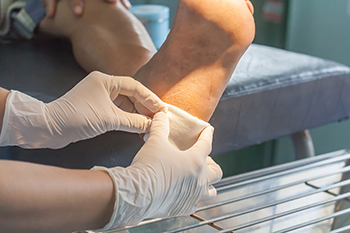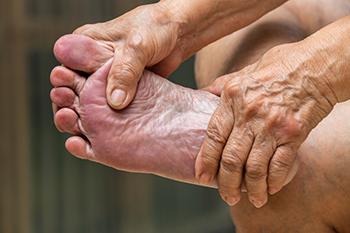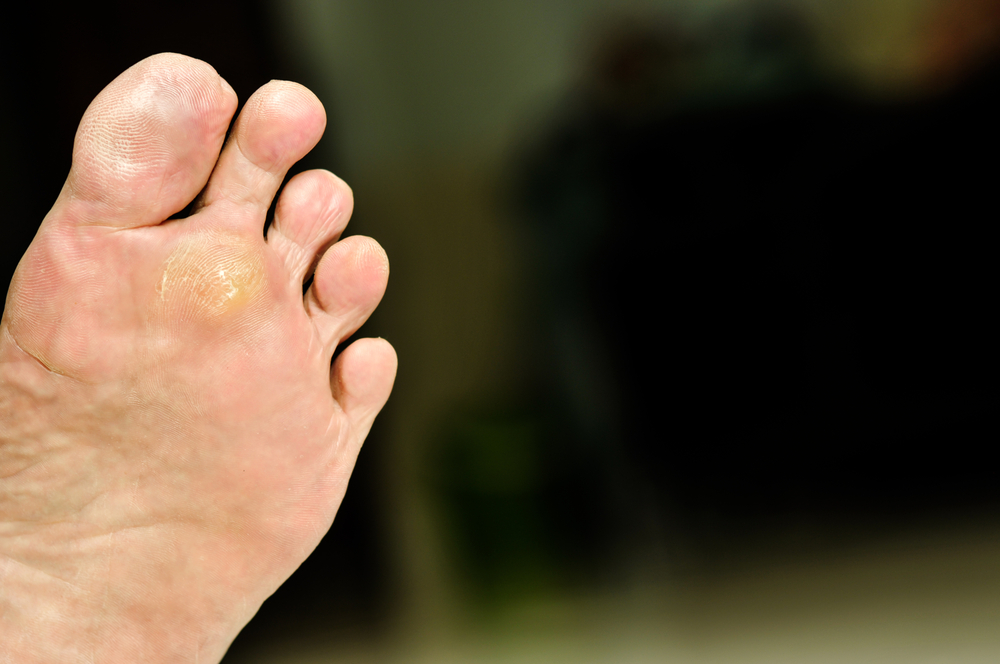Items filtered by date: October 2025
Gout Pain Can Be Managed
Calcaneal Osteomyelitis From a Puncture Wound

Calcaneal osteomyelitis is a serious bone infection in the heel that can develop after a puncture wound to the foot. When bacteria enter through a deep wound, they can reach the bone and cause inflammation, pain, swelling, and difficulty walking. Early care is vital to prevent serious complications. Cleaning the wound thoroughly, avoiding pressure on the heel, and seeking prompt medical attention from a podiatrist can reduce the risk of infection. This foot doctor can diagnose the condition through imaging tests and provide treatment that may include antibiotics, wound care, and surgical management, if necessary. If you have sustained a puncture wound on your foot, it is suggested that you schedule an appointment with a podiatrist who can provide an examination and offer appropriate treatment.
Wound care is an important part in dealing with diabetes. If you have diabetes and a foot wound or would like more information about wound care for diabetics, consult with Evan Young, DPM from Trinity Foot & Ankle . Our doctor will assess your condition and provide you with quality foot and ankle treatment.
What Is Wound Care?
Wound care is the practice of taking proper care of a wound. This can range from the smallest to the largest of wounds. While everyone can benefit from proper wound care, it is much more important for diabetics. Diabetics often suffer from poor blood circulation which causes wounds to heal much slower than they would in a non-diabetic.
What Is the Importance of Wound Care?
While it may not seem apparent with small ulcers on the foot, for diabetics, any size ulcer can become infected. Diabetics often also suffer from neuropathy, or nerve loss. This means they might not even feel when they have an ulcer on their foot. If the wound becomes severely infected, amputation may be necessary. Therefore, it is of the upmost importance to properly care for any and all foot wounds.
How to Care for Wounds
The best way to care for foot wounds is to prevent them. For diabetics, this means daily inspections of the feet for any signs of abnormalities or ulcers. It is also recommended to see a podiatrist several times a year for a foot inspection. If you do have an ulcer, run the wound under water to clear dirt from the wound; then apply antibiotic ointment to the wound and cover with a bandage. Bandages should be changed daily and keeping pressure off the wound is smart. It is advised to see a podiatrist, who can keep an eye on it.
If you have any questions please contact our office located in Trinity, FL . We offer the newest diagnostic and treatment technologies for all your foot and ankle needs.
Wearing the Right Shoes for Standing Jobs

For those who work on their feet all day, wearing the right shoes is essential for comfort, safety, and overall health. Proper footwear offers stability and cushioning while providing the only interaction between your body and the ground. Shoes with safety features, such as slip-resistant soles and arch support, help prevent injuries and fatigue. Wearing the wrong shoes can lead to foot problems like plantar fasciitis, calluses, and lower back pain. A podiatrist can evaluate your feet, recommend supportive footwear, and provide custom orthotics for added relief. If you have developed foot pain during your work day, it is suggested that you consult a podiatrist who can treat various foot conditions and guide you on the proper shoes to wear for optimum foot health.
While working on the feet, it is important to take the proper care of them. For more information about working on your feet, contact Evan Young, DPM from Trinity Foot & Ankle . Our doctor will treat your foot and ankle needs.
Working on Your Feet
Standing on your feet for long periods of time can cause stress and pain in your feet. Your whole body may experience change in terms of posture, back pain, bunions, callouses and or plantar warts. There are ways to avoid these conditions with proper foot care, smart choices and correct posture.
Positive Changes
Negative heeled shoe – Choosing this shoe type places the heel slightly lower than the ball of the foot. These are great for overall foot health. Find shoes that fit you correctly.
Go barefoot – Our feet were not designed to be enclosed for all hours of the day. Try to periodically expose your feet to air.
Eliminate Pain
Foot Exercises – Performing simple exercises, incorporating yoga and doing stretches are beneficial. This will allow increased blood flow to the area and muscles of the foot.
Achilles tendon – Stretching the foot out flat on the floor will relax the calf muscles and tendon. These exercises can be performed almost anywhere. Make sure you add these exercises to your daily regimen.
With a little bit of this information and knowing more about foot health, you will notice changes. Foot stretches and proper footwear will help with pain and prevent further issues.
If you have any questions please contact our office located in Trinity, FL . We offer the newest diagnostic and treatment technologies for all your foot and ankle needs.
Causes of Red Feet in Elderly People

Red feet in older adults can signal underlying health issues that need attention. Peripheral artery disease can reduce blood flow, while venous insufficiency causes blood to pool in the legs, both leading to discoloration and swelling. Diabetes may contribute to poor circulation and nerve damage, increasing the risk of infections. Additionally, fungal infections can also cause redness, along with itching, and irritation. Certain medications may trigger changes in skin color as a side effect. A podiatrist can perform a thorough evaluation, provide treatments, and create a care plan to address these issues and prevent complications. If you notice any changes in your feet, including redness, it is suggested that you consult a podiatrist who can offer you an accurate diagnosis and management tips.
If you need your feet checked, contact Evan Young, DPM of Trinity Foot & Ankle . Our doctor will attend to all of your foot and ankle needs and provide you with quality treatment.
Geriatrics and Podiatry
When people age, some common issues that may occur are bone density loss, dry skin, poor circulation, and rough brittle nails. These issues may also affect your foot health if the necessary steps are not taken to alleviate the problems.
It is important to take care of your feet because feet that are injured or diseased can affect your overall health. Having painful feet hinders your ability to do daily activities or may decrease your willingness to do the things that you need to do.
Visiting Your Geriatrician
As we age, health problems become more likely, so it is essential to visit your doctor for check-ups to ensure that you are doing the best you can to take care of your health. It is recommended to check your feet frequently for any possible cuts, bruises, swelling, corns or any other irregularities.
Taking Care of Elderly Feet
Cracked or dry feet can be treated by applying moisturizer often. It is also important not to wear old socks because the older the sock is, the higher the possibility there will be that there is bacteria there. Wear fresh socks and make sure they fit properly.
Proper foot health means that you can have a more active lifestyle and you will not be bogged down by pain. Foot health also leads to good circulation, which is paramount for overall health.
If you have any questions, please feel free to contact our office located in Trinity, FL . We offer the newest diagnostic and treatment technologies for all your foot care needs.
Unwanted Visitors on Your Feet

Plantar warts are small, rough growths that appear on the soles of the feet and are caused by the human papillomavirus, or HPV. They often develop in areas of pressure, such as the heel or ball of the foot, and may look like a thickened, callused patch of skin with tiny black dots in the center. Symptoms include pain or discomfort when walking or standing, tenderness, and sometimes itching. Plantar warts can be contagious and spread through direct contact with contaminated surfaces, such as public showers or swimming pools. A podiatrist can diagnose plantar warts through a physical exam and may perform tests to confirm the diagnosis. Treatment options include topical medications, cryotherapy, or minor surgical removal. Early treatment can prevent the warts from spreading or worsening. It is suggested that you make an appointment with a podiatrist to receive an accurate diagnosis and effective treatment for plantar warts.
Plantar warts can be very uncomfortable. If you need your feet checked, contact Evan Young, DPM from Trinity Foot & Ankle . Our doctor will assist you with all of your foot and ankle needs.
About Plantar Warts
Plantar warts are the result of HPV, or human papillomavirus, getting into open wounds on the feet. They are mostly found on the heels or balls of the feet.
While plantar warts are generally harmless, those experiencing excessive pain or those suffering from diabetes or a compromised immune system require immediate medical care. Plantar warts are easily diagnosed, usually through scraping off a bit of rough skin or by getting a biopsy.
Symptoms
- Lesions on the bottom of your feet, usually rough and grainy
- Hard or thick callused spots
- Wart seeds, which are small clotted blood vessels that look like little black spots
- Pain, discomfort, or tenderness of your feet when walking or standing
Treatment
- Freezing
- Electric tool removal
- Laser Treatment
- Topical Creams (prescription only)
- Over-the-counter medications
To help prevent developing plantar warts, avoid walking barefoot over abrasive surfaces that can cause cuts or wounds for HPV to get into. Avoiding direct contact with other warts, as well as not picking or rubbing existing warts, can help prevent the further spread of plantar warts. However, if you think you have developed plantar warts, speak to your podiatrist. He or she can diagnose the warts on your feet and recommend the appropriate treatment options.
If you have any questions, please feel free to contact our office located in Trinity, FL . We offer the newest diagnostic and treatment technologies for all your foot care needs.

